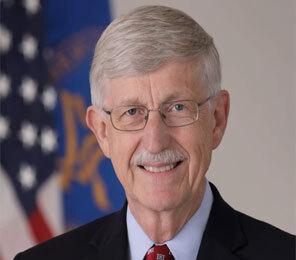
Photo credit: NIH
On Tuesday, October 5, NIH announced that Dr. Francis S. Collins is stepping down as Director of the NIH by the end of 2021, after serving in the role since 2009. Dr. Collins led the NIH through three presidential administrations and countless scientific achievements and challenges, including the COVID-19 pandemic.
Dr. Collins is a visionary who has championed workforce diversity as a scientific opportunity. He recognizes that the NIH’s mission of enhancing health, lengthening life, and reducing illness and disability for everyone in the United States requires a scientific workforce with a range of perspectives and lived experiences. Dr. Collins’ commitment to using evidence-based approaches to make biomedicine more inclusive for researchers from diverse backgrounds has helped advance scientific discovery.
Under his tenure, the NIH has strengthened its commitment to cultivating a diverse scientific workforce by advancing the participation of scientists from underrepresented groups and funding initiatives that help establish equity in biomedical research.
Dr. Collins’ advocacy for diversity, equity, and inclusion led the NIH to establish the Chief Officer for Scientific Workforce Diversity (COSWD) Office in 2014. His dedication to the COSWD Office mission has significantly advanced the creation, implementation, and evaluation of diversity-related programs and activities across the NIH.
The following are among the many initiatives that benefitted from Dr. Collins’ support:
- Diversity Program Consortium (DPC): In 2014, Dr. Collins was essential to the establishment of this NIH-wide program that was designed to provide an evidence base for effective training and mentoring activities to enhance the participation of individuals from underrepresented groups (URGs) in biomedical research careers. Since it was established, it has supported programs at institutions with limited NIH funding (< $7.5 million in total NIH research project grant funding) that serve disadvantaged student populations (> 25% Pell Grant eligible students). The programs are at a variety of institutions, including Historically Black Colleges and Universities and other Minority Serving Institutions, with affiliations across the country. The National Research Mentoring Network, a component of the DPC, has focused on assessing a variety of mentoring activities, including grant writing coaching programs with a 70% success rate in grant accrual for women and scientists from underrepresented racial/ethnic groups.
- Addressing Gender Inequality in the NIH Intramural Research Program: In 2016, Dr. Collins issued a charge to the Addressing NIH Gender Inequality Action Task Force to identify policies and procedures that mitigate gender inequality in biomedicine.
- NIH Workplace Climate and Harassment Survey: The COSWD Office, under the guidance of Dr. Collins, administered the inaugural NIH Workplace Climate and Harassment Survey in 2019 to NIH employees, contractors, fellows, and trainees. The survey results provided critical context about sexual and gender harassment and incivility in research culture to inform current policies and future interventions.
- Faculty Institutional Recruitment for Sustainable Transformation (FIRST): Launched in 2020 with backing from Dr. Collins, FIRST funds institutions to recruit diverse groups of early-stage research faculty and prepare them to thrive as NIH-funded researchers.
- UNITE: In 2021, Dr. Collins created the UNITE initiative to address structural and institutional racism within the NIH-supported and greater scientific community. Through UNITE, staff from all 27 NIH Institutes and Centers have come together to reduce barriers to racial equity in biomedical science for the first time.
Dr. Collins also has championed COSWD programs that reduce barriers to recruiting and retaining scientists from groups underrepresented in biomedical research, such as the Distinguished Scholars Program and the Future Research Leaders Conference.

Photo credit: NIH
NIH Distinguished Scholars Program participants with Dr. Francis S. Collins.
Dr. Collins’ leadership and insight have been indispensable to enhancing workforce diversity. His contributions have led to lasting institutional changes that value, nurture, and honor individuals and communities, especially those underrepresented in science and research.
Although Dr. Collins is stepping down at the end of the year, we in the COSWD Office look forward to continuing the amazing diversity and inclusion work he fostered over the last 12 years. The NIH will continue to support all its employees, including diverse talent, within its Institutes and Centers, throughout the biomedical workforce, and through groundbreaking research.
I look forward to working closely with the incoming leadership to advance the Agency’s commitment to scientific workforce diversity.
Dr. Bernard’s Reflections
On a more personal note, please join me in thanking Francis for his dedication to diversity and inclusion; he has been an outstanding partner and a true catalyst for change. I am honored that I was selected to be part of his leadership team. In my short time as the COSWD, I have had the opportunity to get to know him and his wonderful wife, Diane Baker. They are a team and true servant leaders. Francis’ efforts have benefited the entire biomedical research enterprise and the nation by cultivating a diverse scientific workforce that advances vital knowledge for turning discovery into health. His visionary guidance will be missed.

